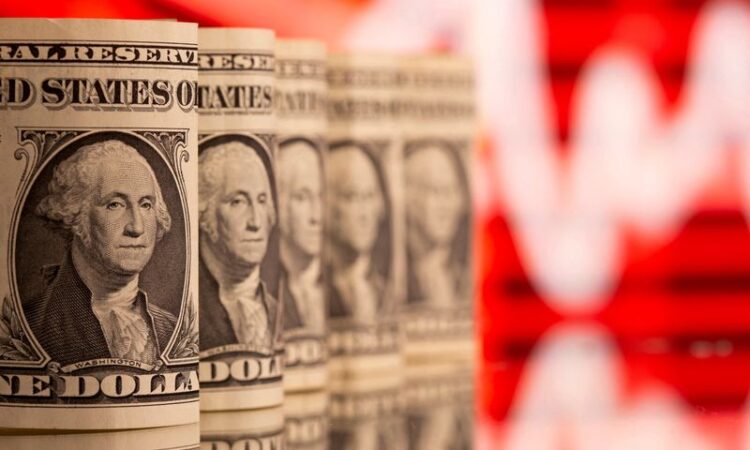
By Rae Wee
SINGAPORE (Reuters) – The dollar was headed for a weekly gain on Friday, aided by solid U.S. growth figures that bolstered the case for higher-for-longer interest rates, while the yen hovered on the weaker side of 150 per dollar ahead of a key policy meeting next week.
The U.S. economy grew at its fastest pace in nearly two years in the third quarter as higher wages from a tight labor market helped to power consumer spending, data on Thursday showed.
That added to bets the Federal Reserve is likely to keep monetary conditions restrictive for longer, driving the dollar broadly higher against a basket of currencies.
The U.S. dollar index steadied at 106.57, having hit a three-week high of 106.89 in the previous session, and was on track for a weekly gain of about 0.4%.
“Certainly, the U.S. economy is a lot more resilient than most expected. It’s both a blessing and a curse for the Fed,” said Christel Rendu de Lint, head of investments at Vontobel.
“But certainly, the chances of a soft landing look greater than most anticipated.”
Sterling edged 0.07% higher to $1.21355, though was not too far from a three-week low of $1.2070 hit on Thursday.
The euro slipped 0.02% to $1.0560 and was headed for a weekly loss of roughly 0.3%.
The European Central Bank (ECB) on Thursday left interest rates unchanged as expected, ending an unprecedented streak of 10 consecutive rate hikes.
“With a rapidly deteriorating macroeconomic landscape, as shown by October PMIs, in our view the ECB will have to tread very carefully going into 2024 and will have no choice but to lower interest rates,” said Julien Lafargue, chief market strategist at Barclays Private Bank.
Data earlier this week showed euro zone business activity took a surprise turn for the worse this month.
Analysts said the dollar was also buoyed by some safe-haven flows, with Asia extending the cautious risk sentiment from Wall Street that saw stocks tumble and kept U.S. Treasuries bid. [US/]
“The retreat in yields was to do with a little bit of flight to quality, because what you saw last night was pretty devastating action in the equity market,” said Tony Sycamore, market analyst at IG.
Treasury yields move inversely to bond prices.
“The last few Fridays … we’ve seen very much flight-to-safety type moves (because) ahead of the weekend, we’re not really sure what’s going to be playing out in terms of Gaza,” said Sycamore.
The Australian dollar, often used as a proxy for risk appetite, gained 0.24% to $0.6337, having slid to a one-year low of $0.6271 on Thursday.
The kiwi similarly languished near a roughly 11-month low and was last 0.1% higher at $0.5825.
EYES ON BOJ
In Asia, the yen remained top of investors’ minds as it stayed on the weaker side of 150 per dollar, a threshold which some see as a potential trigger for intervention by Japanese authorities.
The yen last stood at 150.38 per dollar, languishing near the previous session’s one-year trough of 150.78.
Data on Friday showed core consumer inflation in Tokyo unexpectedly accelerated in October, keeping pressure on the Bank of Japan (BOJ) to phase out its ultra-loose monetary policy settings.
The BOJ is due to meet next week, amid mounting speculation that the central bank could change its bond yield control, with a hike to an existing yield cap set just three months ago being discussed as a possibility.
“If we come in with dollar/yen up at 151 next Monday, then there’s more chance I think they’d lift the cap,” said IG’s Sycamore.
“The higher the dollar/yen goes in the interim, the more chance there is of a tweak.”
(Reporting by Rae Wee; Editing by Lincoln Feast.)






